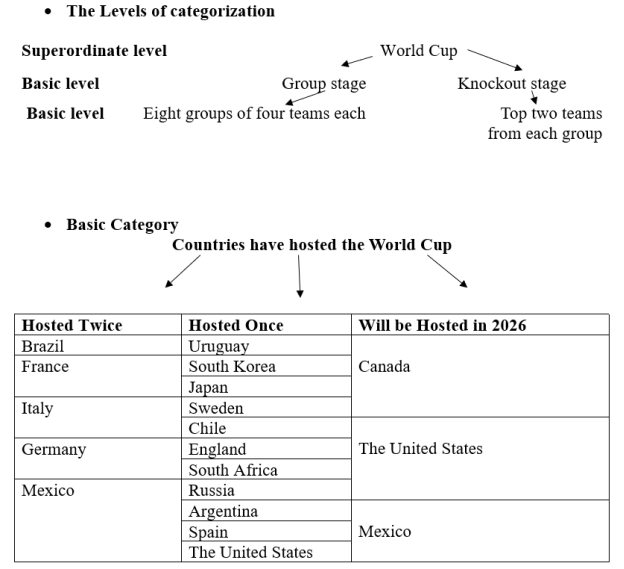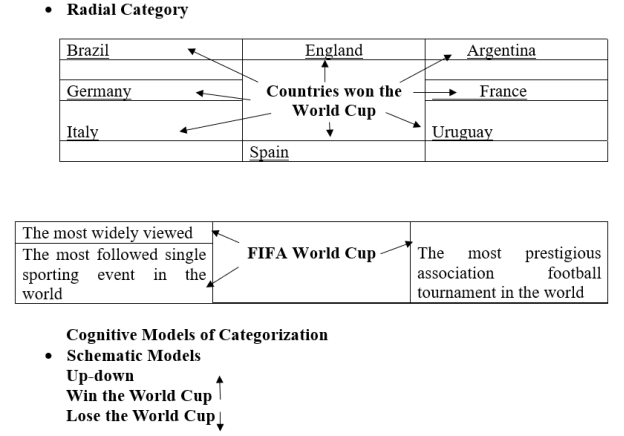The translation of sports terminology presents a unique challenge due to its lingua-cognitive peculiarities. This study deals with the complex interrelation of language and cognition in the translation of sports terminology. By examining various linguistic and cognitive factors, such as cultural connotations, figurative language, categorization, lexical lacunaе, phraseological units, conceptual metaphors inherent in sports terminology, this research aims to point out on the difficulties faced by translators in rendering sports-related texts accurately and effectively across languages. Drawing upon theoretical frameworks from linguistics, cognitive science, and translation studies, this paper explores how translators navigate the nuances of sports terminology, considering both the linguistic structures and cognitive processes involved. Additionally, this study investigates the impact of translation strategies on the transmission of sports-related concepts, with a focus on maintaining both the semantic integrity and cultural relevance of the translated text. Through an analysis of thematic studies and empirical data, this research contributes to a deeper understanding of the lingua-cognitive dimensions of sports terminology in translation, offering insights that can inform translation practice and theory in the domain of sports discourse.
Keywords: translation, terminology, sports terminology, linguistic units, cognitive research.
Перевод спортивной терминологии представляет собой уникальную проблему из-за ее лингво-когнитивных особенностей. Данное исследование посвящено сложному взаимодействию между языком и когнитивными процессами при переводе спортивной терминологии. Путем изучения различных лингвистических и когнитивных факторов, таких как культурные коннотации, образный язык, категоризация, лексические пробелы, фразеологические единицы, концептуальные метафоры и т. д. что касается спортивной терминологии, то это исследование рассмотрит сложности, с которыми сталкиваются переводчики при точном и эффективном переводе текстов, связанных со спортом, на разные языки. Опираясь на теоретические основы лингвистики, когнитивистики и переводоведения, в этой статье исследуется, как переводчики ориентируются в нюансах спортивной терминологии, принимая во внимание как лингвистические структуры, так и задействованные когнитивные процессы. Кроме того, в этом исследовании исследуется влияние стратегий перевода на передачу концепций, связанных со спортом, с акцентом на сохранение семантической целостности и культурной значимости переведенного текста. Благодаря анализу тематических исследований и эмпирических данных это исследование способствует более глубокому пониманию лингвокогнитивных аспектов спортивной терминологии в переводе, предлагая информацию, которая может стать основой для практики и теории перевода в области спортивного дискурса.
Ключевые слова: перевод, терминология, спортивная терминология, языковые единицы, когнитивные исследования.
A couple of decades ago, translation was viewed simply as an information exchange among individuals speaking different languages. However, with the evolution of anthropocentric, communicative, and cognitive approaches in linguistics, translation is now seen as a cognitive endeavor. It involves the translator's task of modeling and aligning semantic understandings for speakers from diverse linguistic and cultural backgrounds.
Previous debates concerning the feasibility of translation and the quest to grasp its multifaceted nature have sparked fresh inquiries into translation modeling. This exploration enriches our comprehension of pivotal translation theory concepts like «equivalence» and «adequacy», which are crucial for evaluating translation quality. Simultaneously, translators, through studying, conceptualizing, and modeling the translation process, begin to recognize its cognitive essence. This understanding not only enhances their professional proficiency but also holds methodological significance, aiding in the development of effective training systems for translation specialists.
A. G. Minchenkov presents a cognitive heuristic model that highlights the nonlinear nature of translation. He underscores the intricate mental processes involved for translators in perceiving and comprehending the source text. It's worth mentioning that the activities of perceiving, understanding, comprehending, and crafting the translated text can unfold either sequentially or simultaneously. The researcher astutely observes that the primary challenge in translation lies in harmonizing the meanings derived from engaging with the source text with the semantic nuances of words and phrases in the target language [1].
Conceptualization and categorization are the major cognitive processes. Conceptualization involves understanding information received, mentally constructing ideas and phenomena, thereby forming conceptual representations of the world, which are encapsulated as concepts in human consciousness. For instance, concepts like house, time, space, eternity, and movement are formed. These concepts are primarily anchored in language through the meanings of specific words, facilitating the retention and transmission of knowledge across individuals and generations.
Categorization, on the other hand, entails organizing the world into distinct categories, discerning groups, classes, or types of similar objects or events. As a cognitive process, categorization involves mentally associating an object or event with a specific category, often identified by the category's name.
Both conceptualization and categorization can be viewed from two primary perspectives: static, as structured systems, and dynamic, as ongoing cognitive processes [2].
The cognitive model theory proposed by G. Fauconnier and G. Lakoff encompasses mental spaces and the cognitive frameworks that organize these spaces, including:
1) Figurative-schematic models, such as receptacle, part-whole, up-down, source-way-aim, and others.
2) Propositional models, which consist of propositions, scripts, bundles of features, taxonomies, and radial categories.
3) Metaphorical, metonymic, and symbolic models [3].
I. N. Remkhe investigates the cognitive translation model as a theoretical structure that allows for illustrating the cognitive operations of translators by identifying connections within dynamic frameworks like classification and situational contexts. He portrays the cognitive translation model as consisting of systems and arrangements that reflect the translator's ideas and understanding [4].


Cognitive Models of Categorization
Metonymical models
The place instead of people
- Countries have hosted the World Cup: instead of People of one Country hosted the World Cup.
- Mbappé scores against England (against football players from England).
- Morocco (Football players from Morocco) attempt to deal with Mbappé.
- Their defensive record is far superior to France (Football players from France)
- His winner against England (Football players from England)
- Managed to keep Spain (Spain players from England) scoreless
The container instead of the contents
Each group plays: instead of teams play (teams including in these groups).
Teams compete: instead of football players compete.
Lexical lacuna е
F ixtures — asporting event arranged to take place on a particular data (белгілі бір күнге жоспарланған спорттық іс-шара)
To be at a standstill - a situation or condition in which there is no movement or activity at all (тоқтау)
Phraseological units
Е yes of the world - conveying a message of hope, viewing human consciousness as having value for the planet as a whole (үміт туралы хабарды жеткізу, адам санасын ең үлкен құндылық ретінде қарастыру)
Stay tuned — to remain as a listener or viewer of the particular radio station or television channel to which one is currently paying attention (бізбен бірге болыңыз, ауыспаңыз, жаңалықтарды күтіңіз).
Take place — to happen, to occur (іс-шараның өтуі).
National-specific vocabulary
National prototypes of the concept “Lockdown”
– In English language — “Lockdown” primarily means blocking. For example, block of social networks or the Internet.
– In Kazakh language- “Lockdown” associated with Pandemic, since the word Lockdown was not widely used before the pandemic situation. Only during the Covid-19 period the word Lockdown begin to be actively used in the meaning of quarantine, isolation. As a result, in Kazakh the primary meaning of this word is quarantine, isolation.
Sensual-receptive component of a mental continuum
Colour designations
Green light — it is associated with the green color of the traffic light, which give permission to go ahead with (a project)
National-specific vocabulary
National mentality
Language facts
Behind closed doors — taking place secretly or without public knowledge.
Semantic field of subjective estimations
Emotional statement of a high degree of feature manifestation, “bare emotionality” — fascinating.
Emotional statement of a high degree of feature manifestation, “bare emotionality”
– huge matches.
Connotative words
Words with connotations which motivations demand knowledge of national cultural context
Еyes of the world- (Еyes, as a source of attention and hope), Apple of Someone's Eye- (Еyes, Like a heart or a soul), Catch Someone's Eye- (Еyes, as a source of interest, attention and curiosity)
Connotative words
Words with obvious motivated connotations
Coverage — 1) Қамту , 2) Ауқымы , қолданылу аясы , 3) Трансляция , репортаж
In conclusion, the intricate relationship between language and cognition becomes particularly apparent when examining the translation of sports terminology. Through this exploration, we have delved into the fascinating nuances of how language shapes our understanding of athletic activities and how translation can both convey and sometimes alter these nuances. From the subtle shifts in meaning caused by cultural and linguistic differences to the challenges of preserving the essence and impact of sporting terms across languages, it is evident that the translation of sports terminology requires a deep understanding not only of language itself but also of the cognitive processes that underpin our comprehension of sports. As we continue to engage with sports on a global scale, acknowledging and addressing these lingua-cognitive peculiarities will be essential for effective communication and appreciation of the diverse athletic endeavors that enrich our world.
References:
- Minchenkov A. G. Cognitive-heuristic model of translation: towards the formulation of the question // Bulletin of St. Petersburg University, Ser.9. 2007. Issue 2 Part II. pp. 208–217.
- Popova Z. D., Sternin I. A. Cognitive linguistics. Moscow: Vostok-Zapad, 2007a. 314 p.
- Fauconnier, G. & Turner, M. (1994). Conceptual projection and middle spaces. UCSD: Department of Cognitive Science Technical Report 9401
- Remkhe I. N. Cognitive features of the translation of scientific and technical text (based on the texts of the metallurgical industry): author's abstract. dis.... candidate of Philological Sciences. Chelyabinsk, 2007. Access mode: http://tmnlib.ru/jirbis/files/upload/abstract/10.02.20/681.pdf (date of application: 7.04.2019)

